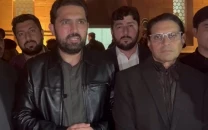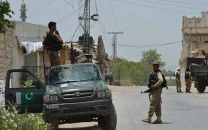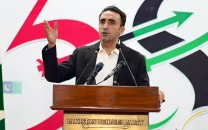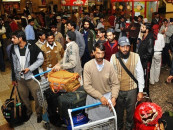WikiLeaks: Pakistan military cast in favourable light
French officials appear sceptical of the military but US officials have been full of praise.

The role of Pakistan Army
Even though some French officials in particular are sceptical of the military, US officials have praised the military over the years.
Similarly, older memos have revealed support for former president and chief of army staff Pervez Musharraf from various countries, including the UAE and Israel. A 2007 memo says, “The United States Government will continue to support Pakistani President Musharraf, and is seeking to boost his military defensive capabilities.”
Even though US officials describe the changes in Pakistan as ‘dramatic’ and ‘encouraging’, the credit is given to the Pakistan Army. Global support for the civilian set-up appears almost non-existent. According to a March 2009 memo, “The Saudis say they have been holding back economic and political support pending evidence that the political situation in Pakistan is stabilising.”
The head of France’s interagency Afghanistan-Pakistan cell Jasmine Zerinini told a member of the House Committee on Foreign Affairs in January 2010, “General Kayani has ‘learned the lesson of Musharraf’ and was staying behind the scenes.”
“However, he is manipulating the government and parliament, to prevent change on Pakistan’s policy towards Federally Administered Tribal Areas along the Afghan border, and also to stir up controversy regarding the Kerry-Lugar bill that ties continued US aid to increased civilian control of the military.”
The Pakistan Army’s reservations about the Kerry-Lugar bill are a matter of public record. A press release issued by the Inter-Services Public Relations on October 7, 2009 about the 122 Corps Commanders Conference stated, “Kerry Lugar bill also came under discussion during the conference. The forum expressed serious concern regarding clauses impacting National Security. A formal input is being provided to the Government. However, in the considered view of the forum, it is the Parliament, that represents the will of the people of Pakistan, which would deliberate on the issue, enabling the Government to develop a National response.”
Zerinini is also quoted as saying that France “does not want to return to a relationship (with Pakistan) based on military equipment sales, as in the 1980s, and is instead focusing on counter terrorism in addition to economic and trade links.”
In a briefing memo to Secretary of State Hillary Clinton in 2009, France’s relationship with Pakistan was described as “relative newcomers who have requested close cooperation with the UK and US, particularly in areas of counter-terrorism and counter-insurgency assistance.” However, the memo also states, “Paris officials complain that Pakistani cooperation in combating the Afghan Taliban refuged in their country is weak, if not non-existent.”
Jasmine Zerinini also “argued that the west had missed its opportunity to push the Pakistani military to crush the Afghan Taliban taking refuge in Pakistan. Citing Jalaladin Haqqani as an example, Zerinini said in 2004 he had standing as a leader in the jihadi community, but did not have the organisation to represent a significant military threat. However, since then, large amounts of funding, predominately from Gulf donors, have allowed Haqqani to create a network that would be difficult for the Pakistani military to defeat, even if it had the will to do so.”
Memos released by WikiLeaks support the theory that Gulf donors are funding militancy.
US officials highlighted the success of Pakistan’s military operations in several meetings. The chief of the Turkish General Staff General Ilker Basbug met with US Secretary of Defence Robert Gates in Ankara on February 6, 2010. The memo states, “Basbug also raised Pakistan, recalling his October visit at the invitation of General Kayani. During his visit to Swat he had witnessed a hundred-fold improvement in security since his previous visit, citing the return of civilian populations to the region as a clear success for Pakistani forces. Gates agreed, observing that the degree of success by Pakistani forces ran counter to all of our intelligence predictions.”
Gates praised the Pakistan Army in a meeting with France’s Foreign Minister Bernard Kouchner on February 8, 2010. The memo states, “SecDef (Gates) described the dramatic changes that had taken place over the past year.”
Gates also noted that it was “astonishing that President Zardari had remained in power and that the Pakistanis had conducted such effective COIN (counter-insurgency) operations.”
According to the memo, Gates “noted that coordination between ISAF (International Security Assistance Force) and Pakistan’s armed forces was improving - and this was creating a more difficult situation for the Taliban along the border. The Pakistan operation in South Waziristan had flushed out Taliban and al Qaeda elements; they were more vulnerable on the move. Moreover, Pakistan’s aggressive campaign against the insurgency had won broad political support among all political parties. Operations in the West and North-West had begun to accrue respect for Pakistan Army that Musharraf had squandered. It is important for all of us to talk to the Pakistanis and provide economic assistance. SecDef commented that one can never be an optimist about Pakistan, but that the changes had been striking. Kouchner agreed with SecDef’s analysis that the changes in both the political and military spheres were ‘nothing short of a miracle’.”
However France’s Minister of Defence Herve Morin struck a different tone in his meeting with Gates the same day. Morin “expressed doubt about the willingness of the Pakistani government to fight extremists at home.” Morin said Afghan President Hamid Karzai had told France that if the Pakistan-Afghanistan border was closed, it would largely solve issues in Afghanistan.
According to the memo, “SecDef replied that he had told the Pakistani government two weeks earlier that al Qaeda was helping the Pakistan Taliban to destabilise Pakistan. SecDef highlighted the dramatic changes in Pakistan over the past 18 months, especially in Swat and Bajaur provinces, which offered some hope of progress. SecDef said that there was increasing coordination between US and Pakistani forces across the border.”
In a June 2009 meeting between then US Centcom Commander General David Petraeus and Egyptian General Intelligence Service Chief Omar Soliman, Petraeus is quoted as saying he was “encouraged by the Pakistani military’s operations in the Swat Valley and Northwest Frontier Province, including their focus on holding and rebuilding affected areas.”
Soliman, according to the memo, “credited the Pakistani government for doing a better job of convincing people that extremists pose a real threat to Pakistani national security.”
Published in The Express Tribune, December 1st, 2010.



















COMMENTS
Comments are moderated and generally will be posted if they are on-topic and not abusive.
For more information, please see our Comments FAQ